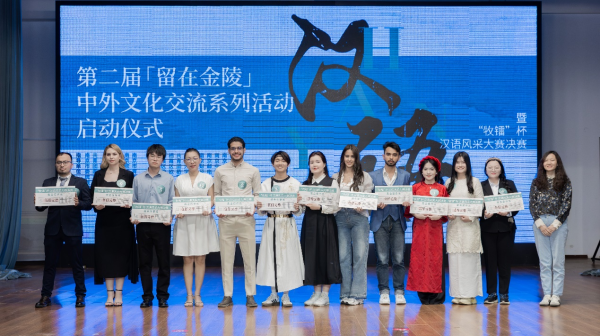| The current position: | Home page | > News Center |
On April 20, coinciding with the 16th United Nations Chinese Language Day and the traditional Chinese solar term of Grain Rain, the second edition of the "Stay in Jinling" Sino-Foreign Cultural Exchange Series was successfully held at the Xianlin Campus of Nanjing University of Chinese Medicine. The event was guided by the Nanjing Municipal Committee of the United Front Work Department and the Communist Youth League Nanjing Municipal Committee, and co-organized by the Nanjing Overseas Returned Scholars Association and the Nanjing Youth Federation.
As the main venue, Nanjing University of Chinese Medicine showcased its distinctive strengths in traditional Chinese medicine (TCM) culture by creating an immersive TCM experience zone. Activities such as acupuncture and tuina massage, health-preserving exercises, and sachet-making workshops highlighted the charm of China’s ancient medical heritage to a global audience.
The spotlight of the event was the "Spring Awakening: Bridge of Language" season finale and the "Mulei Cup" Chinese Proficiency Competition. Twelve finalists from six universities delivered themed speeches and cultural performances under the theme "Seeing the World Through Nanjing," sharing their personal connections with the cultural legacy of Jinling (Nanjing’s historical name). Contestants included Southeast Asian students deeply engaged in Sinology and Central and Western Asian scholars dedicated to cross-cultural collaboration under the Belt and Road Initiative. Their diverse cultural perspectives sparked enthusiastic applause. After fierce competition, winners were awarded first, second, third prizes, and honorary mentions.
The success of the event stemmed from a collaborative "city-district coordination and university-local collaboration" model. The Nanjing Overseas Returned Scholars Association provided organizational leadership, the Nanjing Youth Federation mobilized youth-driven communication, the Qixia District ensured localized logistical support, and Nanjing University of Chinese Medicine infused unique cultural elements. This innovative approach—integrating cultural exchange, civilizational dialogue, group cooperation, university expertise, and corporate participation—offers a pioneering blueprint for advancing international cultural interactions, deepening mutual appreciation among civilizations, and collectively sharing China’s stories with the world.
